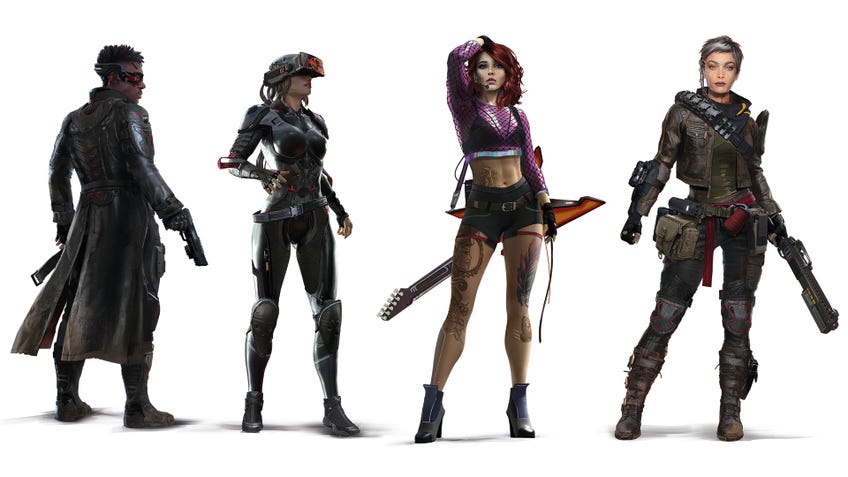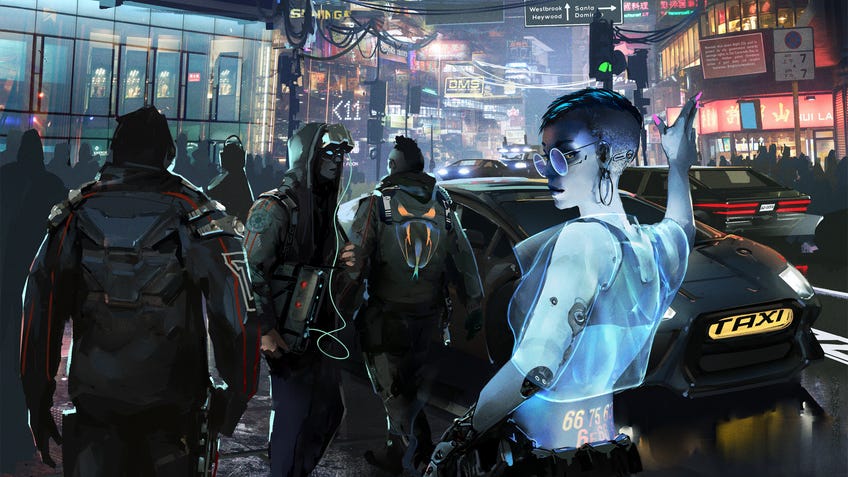“I built a world where people were rebels”: Cyberpunk creator Mike Pondsmith on why the tabletop RPG continues to endure
Designer talks filling the gap between Red and 2077, staying relevant over 30 years, and his collaboration with CD Projekt Red.
Cyberpunk has never been more popular. The RPG series is riding high off the back of its first video game adaptation, Cyberpunk 2077, and its latest tabletop edition in Cyberpunk Red. Things are looking bright for the future of the grungy science-fiction franchise.
Mike Pondsmith is the creator of Cyberpunk and the co-founder of R. Talsorian Games, the family-run studio responsible for publishing the tabletop RPG. To Pondsmith, Cyberpunk isn’t just a series of editions that lead from the original released in 1988 to the nineties’ Cyberpunk 2020 and Red in 2019. Cyberpunk is a timeline that continues to stretch forward for as far as Pondsmith’s imagination can glimpse. “I treat Cyberpunk and the world of 2020, Red and 2077 as though it's a long-running comic book,” he says.
After the release of Cyberpunk 2020 in 1990, Pondsmith spent some time working for the Xbox team at Microsoft, before returning to Cyberpunk to discover that R. Talsorian had been contacted by The Witcher developer CD Projekt Red regarding a video game adaptation. Though Pondsmith had been approached by video game companies in the past, Cyberpunk 2077 turned out to be the adaptation that the game designer had always envisioned.
“There’s a sequence in the video game - I won’t spoil it but, when I was playing it, I was like, ‘Oh man, they nailed it, they were really faithful to that.’”

It helped that the people who approached R. Talsorian from CDPR were longtime fans of the tabletop RPG. Pondsmith reminisces about working with a company to create Polish-language versions of the original Cyberpunk - “You have to remember that the [Berlin] Wall hadn’t fallen yet, so I was imagining a group of people smuggling copies in under their coats” - and wonders today about the domino effect that exchange might have had on the current success of the series.
R. Talsorian and CDPR have both benefitted from this relationship, with Cyberpunk Red seeing a surge in interest with the release of 2077 in late 2020. “After 2077 came out a lot of players automatically went over to Red,” Pondsmith says. The video game publisher, meanwhile, has received hands-on consultation from the creator of the original tabletop RPG.
I always say that it is not an aspiration to live in the world of Cyberpunk, It’s implicitly dangerous.
The current timeline for Red is an alternative-history 2045 in which Night City has just seen the end of an all-out war between several corporations and the various factions that opposed them. How things get from this to the thriving – if still incredibly dangerous – Night City of 2077 is not clear, but Pondsmith has plenty of ideas on the topic. “We have so many years to fill in before we can even get to 2077, we have to decide between all of us where we fit the tabletop game into that story,” he notes.
By “we” Mike Pondsmith isn’t just referring to R. Talsorian - which includes Cyberpunk co-designers Lisa and Cody Pondsmith, his wife and son - but also CDPR. As a prequel to the video game, Red has the responsibility of setting things up for the world that players step into in Cyberpunk 2077, which is why Pondsmith is still collaborating with the studio even after the video game’s release: “It’s no longer just we do this or that, because the nature of our relationship is that we move forward together.”
Even if you win, you can't assume that you will have always won. Corporations are now the nations of this world.
Though the tabletop RPG’s existing timeline had to remain consistent in Red, R. Talsorian made sure to make the latest edition’s gameplay more accessible than its predecessors. “Games are generally simpler now; not as crunchy, they’re more story-driven” Pondsmith explains. “We had to work out ways to simplify it [Cyberpunk] without changing the feel of it too much.”
Despite the change in gameplay mechanics, the soul of Cyberpunk remains firmly intact in Red.
“I always say that it is not an aspiration to live in the world of Cyberpunk,” Pondsmith states grimly. “It’s implicitly dangerous.”

Though many associate Cyberpunk with stylish outfits, flashy prosthetics and the bright skyline of Night City, it is a series about the endless cycle of corporations rising and falling, only to rise once again. Recalling the sequence of events that leads to corporate dominance in 2077, Pondsmith highlights how the economic peak of the 2020s enabled the businesses of Cyberpunk to exploit and oppress their way into full-scale war, ending in the shattered wreck of Cyberpunk Red’s Night City.
“Even if you win, you can't assume that you will have always won. Corporations are now the nations of this world. And, once again, we are ants under the feet of elephants.”
Cyberpunk is the kind of series that remains engaging because it touches important topics, albeit with a lot more neon and sleek chrome.
It’s these narratives of corporate exploitation, and the complacency of the people who think they’ve defeated them, that Pondsmith believes has kept Cyberpunk relevant. Time may pass and the style of classic 1980s Cyberpunk might look ridiculous now – alongside aspects of the series that have received criticism for their depiction of certain minority cultures, and the general criticism that’s been levied at the Cyberpunk genre for relying on orientalist imagery – but the ‘punk’ heart of the movement helps it keep beating. “I've always been proud of the fact that I built a world where people were not just oppressed, they were rebels,” Pondsmith says.
Considering the current issues we’re facing in 2022 – including rising costs of living, the immense wealth being flaunted by unregulated billionaires, the devastating effects of global warming and conflicts caused by egotistical leaders – Cyberpunk is the kind of series that remains engaging because it touches on all of these topics, albeit with a lot more neon and sleek chrome. The accessibility of Red and the popularity of 2077 have certainly helped Cyberpunk reach a new audience, but it’s the series’ sharp criticism of corporate greed and the opportunity to fight against it that have kept players old and new alike playing to this day.
As Pondsmith puts it: “The rebels might not win all the time, but in their own neighbourhood they are not going to take it easily.”


